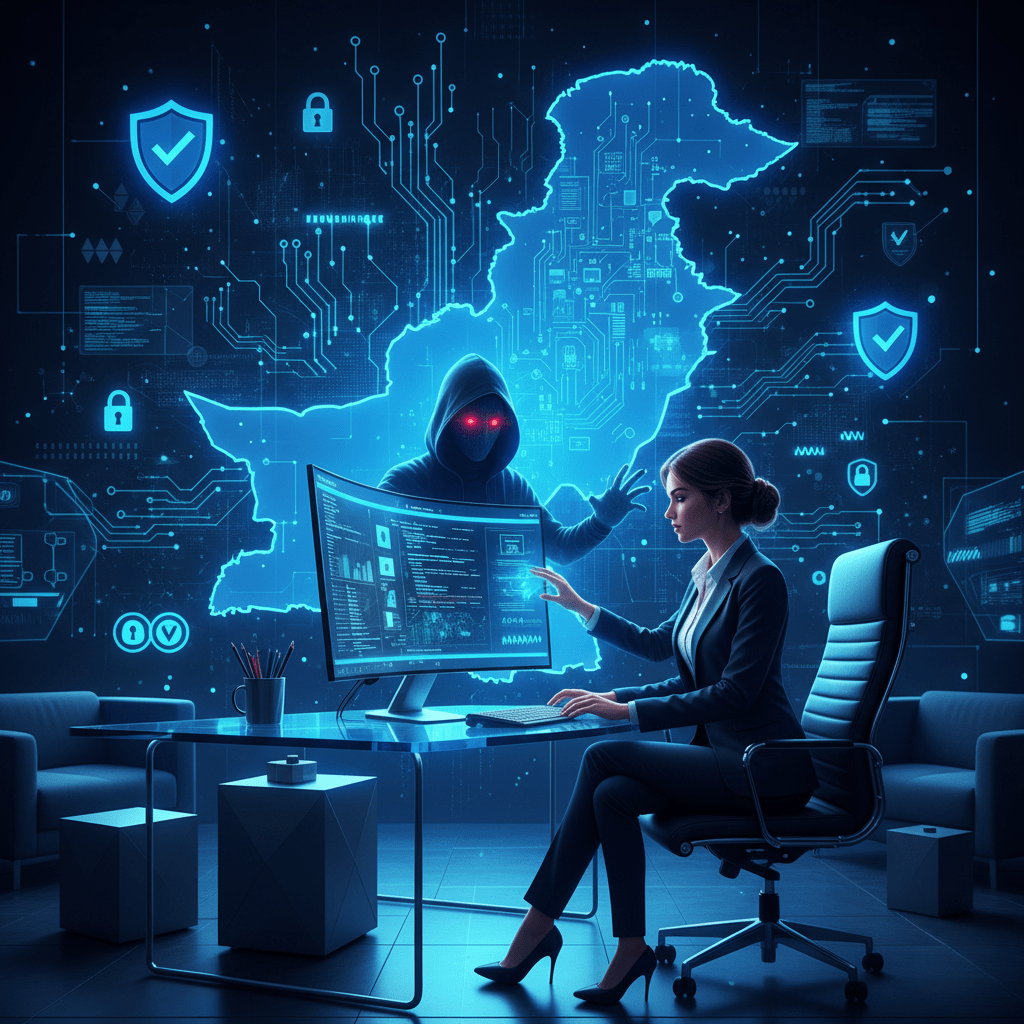Cybersecurity in Pakistan has become essential as cyberattacks continue to rise across businesses, government systems, and personal devices. Picture an employee working normally on her computer while, in the background, a hacker secretly accesses confidential files. He steals sensitive data and sells it to cybercriminals, who then demand ransom from the company.
This isn’t fiction — it happens daily. That’s why organizations now invest in cybersecurity strategies and hire skilled professionals to protect their digital assets. To stay updated on the latest digital threats, visit our Tech News section.
What Is Cybersecurity?
Cybersecurity is the practice of protecting computers, networks, and digital systems from unauthorized access, cyberattacks, and data breaches. Companies rely on cybersecurity specialists to safeguard confidential information and ensure system availability.
The CIA Triad forms the base of cybersecurity:
- Confidentiality – Only approved individuals can access data
- Integrity – Information remains accurate and unchanged
- Availability – Systems and data must be accessible when needed
Strong authentication methods — usernames, passwords, and verification steps — help maintain this security.
Types of Cybercrimes
Cybercrime includes illegal activities involving computers or networks. Common forms include:
Denial of Service (DoS)
Hackers overload servers, preventing real users from accessing services.
Malware Attacks
Viruses, trojans, and worms infect devices and cause damage.
Man-in-the-Middle Attacks
Hackers intercept communication to steal data.
Phishing
Fake emails deceive people into sharing passwords or personal info.
Other techniques include SQL injection, password cracking, eavesdropping, and cross-site scripting.
For more updates on cyber threats in Pakistan, follow our Tech News updates.
What Motivates Cybercriminals?
Cybercriminals often:
- Steal money
- Damage reputations
- Disrupt operations
- Fulfill political or religious motives
- Hack for fun or challenge
Types of Cybercriminals
- Black-Hat Hackers: Perform malicious activities
- White-Hat Hackers: Ethical experts who fix vulnerabilities
- Gray-Hat Hackers: Operate between both
- Suicide Hackers: Attack for social causes
- Script Kiddies: Use ready-made tools
- Cyber Terrorists: Target national infrastructure
- State-Sponsored Hackers: Work for government agencies
- Hacktivists: Promote political messages
Who Are Cybersecurity Experts?
As cybercrime grows, companies increasingly depend on cybersecurity experts. Their responsibilities include:
- Monitoring networks
- Fixing vulnerabilities
- Installing security tools
- Tracking suspicious activity
- Preventing unauthorized access
Key Domains in Cybersecurity
Professionals work across several areas:
- Asset security
- Network security
- Security architecture
- Identity and access management
- Security assessment
- Software security
- Risk management
They also employ best practices such as strong passwords, two-factor authentication, encryption, and avoiding phishing scams.
Cybersecurity Education and Certification
Popular cybersecurity certifications include:
- CompTIA Security+
- CEH (Certified Ethical Hacker)
- CISSP
- CISA
- CISM
- CRISC
- CSSP
These programs help students become ethical hackers, auditors, and cybersecurity managers.
Want to stay updated about new cybersecurity courses and digital trends in Pakistan? Visit PukaarPakistan’s Tech News section.
Conclusion: Start Your Cybersecurity Journey Today
Cybersecurity in Pakistan is more important than ever as cyber threats increase each year. Whether you aim to protect your organization or build a profitable career, now is the perfect time to enhance your cybersecurity skills.
For continuous updates on digital trends, cyber threats, and tech developments, explore PukaarPakistan’s Tech News.














